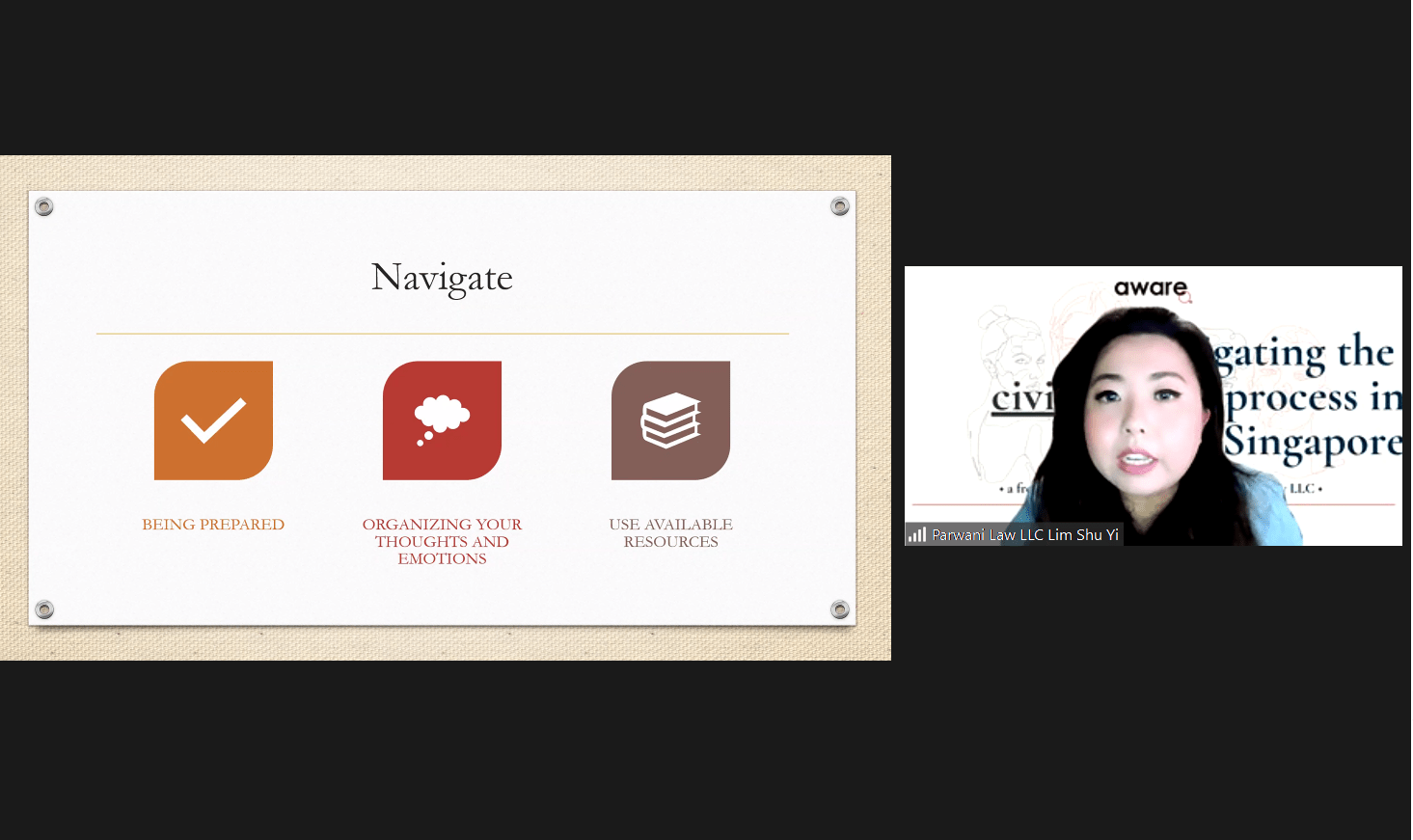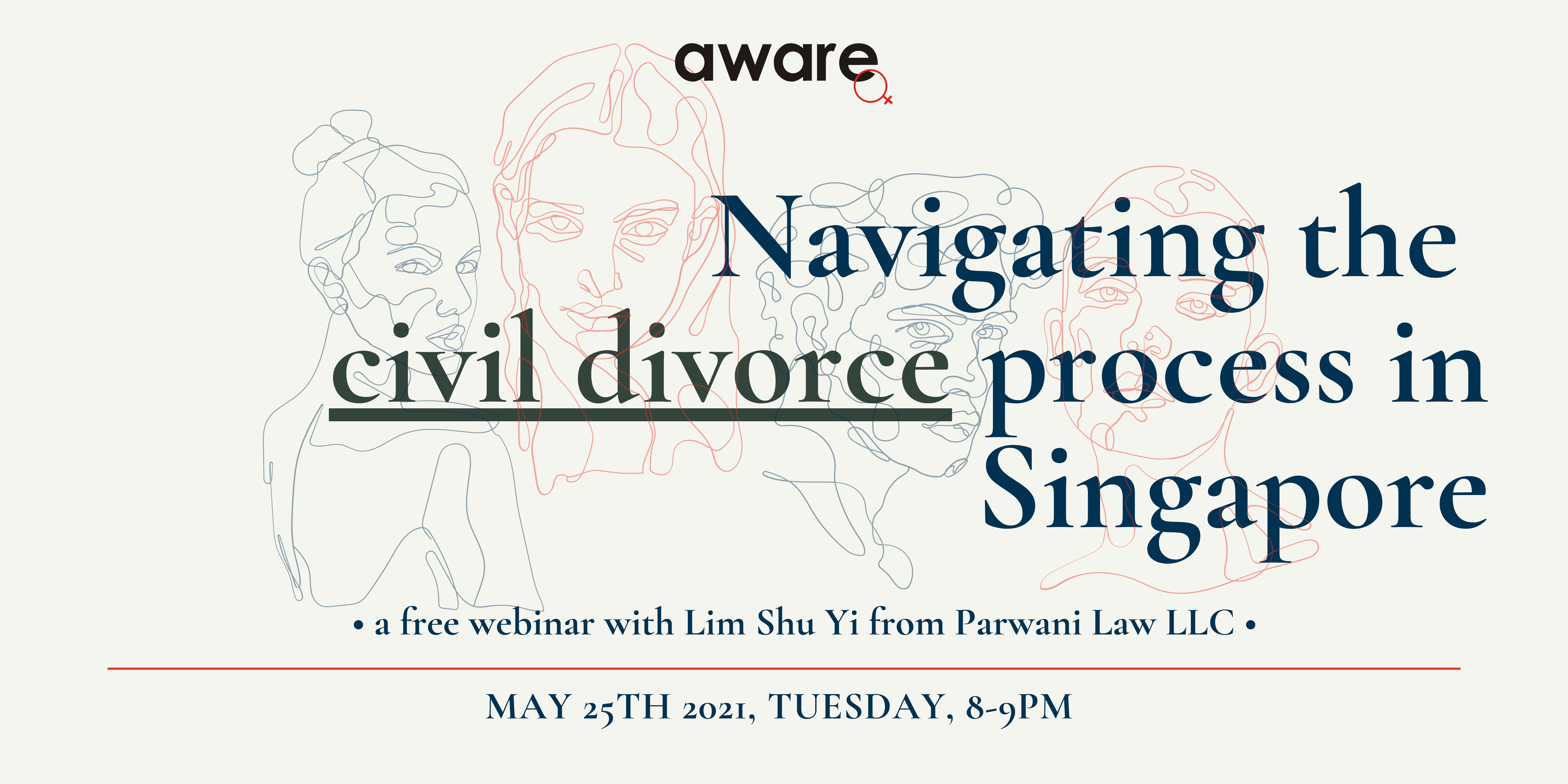-
Advocacy Theme
-
Tags
- Abortion
- Adoption
- Caregiving
- CEDAW
- Disability
- Domestic Violence
- Domestic Workers
- Harassment
- Healthcare
- Housing
- International/Regional Work
- Maintenance
- Media
- Migrant Spouses
- Migrant Workers
- Muslim Law
- National budget
- Parental Leave
- Parenthood
- Polygamy
- Population
- Race and religion
- Sexual Violence
- Sexuality Education
- Single Parents
- Social Support
- Sterilisation
- Women's Charter
A Recap: Navigating the civil divorce process in Singapore (webinar)
June 7th, 2021 | Family and Divorce, News

Written by Lee Chong Ming, AWARE intern
On 25 May 2021, AWARE hosted a free webinar with Lim Shu Yi from Parwani Law LLC on navigating the civil divorce process in Singapore.
The webinar had 88 attendees from many walks of life. While most of the attendees were individuals seeking advice for their own personal situations, several social service professionals and students were present to learn more about the civil divorce process.
Since the circuit breaker period, law firms have reported an increase in divorce-related inquiries, possibly due to heightened tensions and stress from working at home and managing childcare. There has also been a rising number of divorces between younger couples in recent years, as highlighted by new data in a Ministry of Social and Family Development (MSF) report. Hence, women contemplating divorce proceedings need to first familiarise themselves with the proceedings and technical know-how in order to maintain a clear direction throughout the process.

In the webinar, Shu Yi covered practical solutions and resources that women can use to navigate legal proceedings with more ease.
At the outset, she provided clarifications to certain legal terms to illustrate how divorce proceedings can be intimidating and/or confusing, and highlight the importance of being focused during this emotionally turbulent period. For example, Shu Yi explained the differences between the commonly confused terms “care and control” and “custody”. She also described the differences between undergoing uncontested and contested divorce.
Shu Yi then described the renewed vision of family justice, through the framework of therapeutic justice. The Family Justice Courts and family justice community, she said, are trying to engender a shift in mindsets so that the resolution of family disputes need not be adversarial in nature. Therapeutic justice compels us to prioritise the protection of families and children, by steering parties towards amicable and empowering outcomes. We should employ such a “lens of care” to examine how laws and legal procedures, as well as the roles and behaviors of family justice participants, can be damaging in family disputes. This requires a collective effort to rethink laws and procedures and ensure that they are more intentional and helpful for families as they undertake new lives apart.
After setting out the above, Shu Yi guided participants down the roadmap to civil divorce proceedings through useful resources such as the documents readily available for public use on the Family Justice Courts website. She went through a checklist of essential documents and information that parties need to provide over the course of divorce, including methods on deriving a maintenance sum, permutations on the distribution of matrimonial assets and the concept of costs of divorce proceedings.
In rounding out the information provided above, Shu Yi spent some time explaining the need to manage one’s expectations and emotions during the divorce. Many women feel very alone when they undergo divorce, but ideally they should feel empowered to get through the proceedings with confidence. Shu Yi noted that support groups and counselling services may therefore be good options for women to consider when undergoing a stressful divorce. She went through a list of some available counselling services and support centres in Singapore, including the Court Friends/Friends of Litigants-in-Person (FLiP) Programme at the Family Justice Courts (FJC). Hopefully, accessing such services can keep women emotionally grounded and remind them of their priorities: i.e. to start the next chapter of their lives without disadvantage.
Following Shu Yi’s presentation, participants were invited to ask questions on the divorce process and legal proceedings. Many raised queries about the calculation of matrimonial assets and the enforcement of care and custody.
At the conclusion of the webinar, feedback from attendees was collected, with most sharing that they found the session to be informative and helpful—a much-needed avenue for individuals to learn about the divorce process and resources. They also praised Shu Yi for being empathetic and knowledgeable.
“The speaker was clear in sharing about the topic,” commented one attendee. “I liked that she covered the checklist for the proceedings and some of the more important considerations [for divorce].”
If you would like to receive pro bono legal advice on divorce, consider making an appointment at AWARE’s free legal clinic. Read more about that service here.



